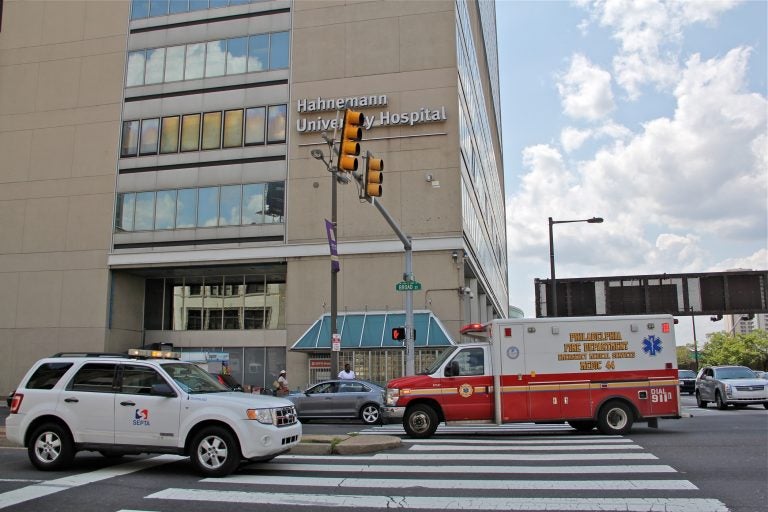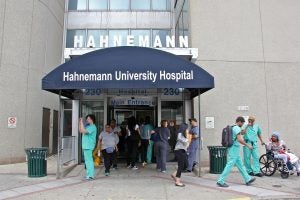U.S. Justice Department will fight sale of Hahnemann residency program
The federal Centers for Medicare and Medicaid Services, which funds the residencies, opposed the sale of the 550-plus slots from the beginning.

Hahnemann University Hospital. (Emma Lee/WHYY)
Lawyers for the Department of Justice are appealing in U.S. District Court a federal bankruptcy judge’s decision to allow the sale of Hahnemann University Hospital’s medical residency programs.
Judge Kevin Gross approved the sale of Hahnemann’s 550-plus residency slots for $55 million to a group of six Philadelphia area health systems led by Jefferson University Hospitals. The federal Centers for Medicare and Medicaid Services, which funds the residencies, opposed the sale.
CMS pays about $100,000 a year per resident slot at hospitals all over the country. A portion of the money goes to resident salaries, and the other portion goes to defray the costs that a hospital must incur to host the residents: insurance coverage, facility costs and other infrastructure. CMS, which is a part of the Department of Health and Human Services, signs provider agreements with hospitals, allocating them a certain number of residents for a variety of programs.
The group of six health systems wants to buy the ability going forward to hire those positions, whose salaries are paid for by the government. According to Laurence Merlis, executive vice president for strategic partnerships at Jefferson, the consortium has hired 265 of Hahnemann’s former residents.
Those residents and others who were immediately orphaned by Hahnemann’s announced closure have already found other jobs. The sale of the slots would be for the ongoing residency programs.
Justice Department attorney Marc Sacks has argued that the provider agreement CMS has with hospitals should not be considered an asset of Hahnemann. Instead, it’s a contract, subject to the regulation of the agency.
“Residency Slots are mere authorizations for a hospital to receive certain forms of Medicare reimbursement, but custody and control over the Residency Slots belong exclusively to the Secretary [of HHS],” Sacks wrote in the government’s request for a stay, filed Thursday.
“Contrary to the Debtors’ claims, Hahnemann’s provider agreement is not the Debtors’ property. It is not a part of the estate and cannot be sold.”
Lawyers for the Justice Department argued the provider agreement cannot be transferred unless there is a change in ownership. Because Hahnemann is closing and the hospital is not transferring any other aspects of its operations, Sacks argued, that does not count as a change of ownership.
Attorney Mark Minuti, representing Hahnemann’s owner, has argued that the hospital was not officially closed because it was still providing services such as the transfer of medical records to patients. He said the sale would ensure that the residency slots remained in the Philadelphia area.
But in his argument, Sacks explained that there is already a process in place, outlined by CMS regulations, for how to redistribute residency slots when a hospital closes. He noted that, because that process gives priority to local hospitals, it was likely that Jefferson and the other five hospitals could absorb the residency slots through the proper channels — and for free.
Sacks and others, including the union that represents Hahnemann’s 800 nurses, worried the decision to allow the sale could be an incentive to struggling teaching hospitals to sell off their residency programs.
Elected officials agreed with that take. Earlier this week, U.S. Rep. Frank Pallone, a Democrat from New Jersey who heads the Energy and Commerce Committee, urged CMS to appeal the decision along with Ways and Means Committee Chairman Richard Neal of Massachusetts.
“The approval of this $55 million sale sets a dangerous precedent and sends a signal to Wall Street that there is money to be made off the downfall of community hospitals,” the two wrote in a statement.
Judge Gross’s primary concern is getting Hahnemann’s creditors as much value out of the hospital’s assets as possible. The government has until Tuesday to win a stay of his ruling in U.S. District Court; if no stay is granted, the sale could go through as soon as Wednesday.
WHYY is your source for fact-based, in-depth journalism and information. As a nonprofit organization, we rely on financial support from readers like you. Please give today.






